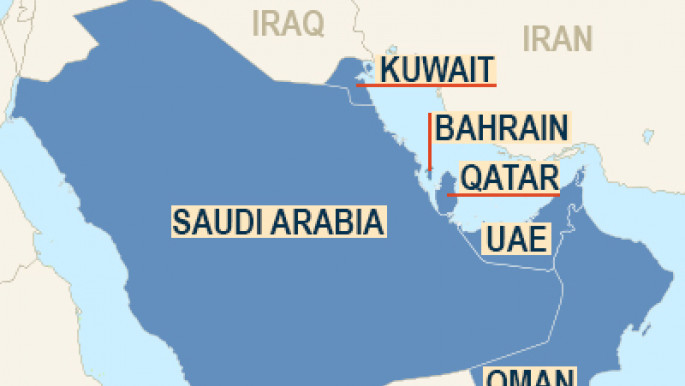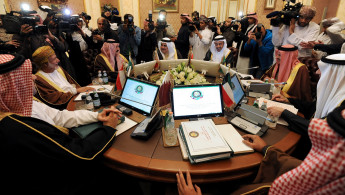IS, Yemen and Syria top priorities for GCC summit
The GCC is convening its 36th summit in Riyadh after what can only be described as an eventful year, and is set to discuss key regional issues - including Iran.
3 min read
Gulf foreign ministers met on Tuesday in Riyadh ahead of Today's GCC summit [AFP]
Leaders of the Gulf Cooperation Council (GCC) member states began arriving on Wednesday night in Riyadh, to take part in the 36th summit of the regional bloc, which kicks off on Thursday.
Saudi King Salman will take the chair for the first time after ascending to the throne, taking over the GCC presidency from Qatar.
The leaders of the six-nation GCC will discuss key regional and international issues, which are expected to include the fight against terrorism, closer economic cooperation on the back of falling oil prices and the situation in Syria, Yemen, Palestine and others.
There is tight security in the Saudi capital, with the main thoroughfares adorned with the flags of the member states - Saudi Arabia, Bahrain, the United Arab Emirates, Oman, Kuwait and Qatar.
Eventful year
Qatar's one-year presidency was eventful, with many challenges and major developments occuring since the last GCC summit.
Perhaps the leading development was the military intervention by GCC nations - with the exception of Oman - in Yemen to put down the Iranian-backed Houthi rebellion against the internationally recognised government.
The Doha Summit was previously able to resolve some differences among Gulf countries, especially in relation to foreign policy.
Following inter-Gulf reconciliation, the GCC was able to focus on developing joint GCC institutions, particularly security agencies such as the Unified Gulf Police force.
The force's main remit is to improve Gulf-wide counter-terrorism efforts, following a number of attacks in Saudi Arabia, Bahrain and Kuwait.
Five priorities
Five issues will top the agenda of the GCC summit, according to well-positionned Gulf sources.
At the head of the list will be the war in Yemen.
The summit is not expected to produce any surprising decisions, and will likely support both Saudi-led military efforts to push back Houthi rebels and the political efforts to end the Yemeni crisis.
Counter-terrorism will also figure highly on the GCC summit's priorities.
During last month's meeting of GCC interior ministers, it was agreed to step up efforts to dry up the sources of extremism and cut off revenue streams used by "terror organisations".
On Syria, the Gulf summit will throw its weight behind Saudi efforts to unify the Syrian opposition, which is currently also meeting in Riyadh in a bid to put together a unified delegation to negotiate with Bashar al-Assad.
The GCC summit could also call for all foreign forces to withdraw from Syria, and will likely renew the position of GCC countries rejecting any role for Assad in the country's future.
Next will be the bloc's relations with Iran and Turkey, where some differences could emerge.
Since the previous summit, Iran signed a nuclear with the major powers, which will have a direct impact on the GCC countries, as Iran is slowly reintegrated into the international community and global oil markets.
Many GCC countries - especially Bahrain - continue to accuse Tehran of meddling in their domestic affairs.
However, an initiative launched by Qatar's Emir Tamim bin Hamad al-Thani for dialogue with Iran at the UN in September could provide a way forward, and the summit might adopt it in some form.
The emir had said Qatar was willing to host "a dialogue" between the Gulf and Iran to agree on rules organising bilateral relations on the basis of non-interference in internal affairs.
Iran welcomed the call at the time, while no other Gulf capital has officially commented on the initiative.
With regard to relations with Ankara, Saudi Arabia, Qatar and Turkey have been increasingly coordinating their positions, and some say the trilateral relationship now amounts to an informal alliance.
While there have been some calls for the GCC summit to express support for Turkey, and provide political and economic backing following Russian sanctions, some Gulf nations, especially the UAE, are reportedly not too keen on the Saudi-Qatari alliance with Turkey.
Saudi King Salman will take the chair for the first time after ascending to the throne, taking over the GCC presidency from Qatar.
The leaders of the six-nation GCC will discuss key regional and international issues, which are expected to include the fight against terrorism, closer economic cooperation on the back of falling oil prices and the situation in Syria, Yemen, Palestine and others.
 |
|
There is tight security in the Saudi capital, with the main thoroughfares adorned with the flags of the member states - Saudi Arabia, Bahrain, the United Arab Emirates, Oman, Kuwait and Qatar.
Eventful year
Qatar's one-year presidency was eventful, with many challenges and major developments occuring since the last GCC summit.
Perhaps the leading development was the military intervention by GCC nations - with the exception of Oman - in Yemen to put down the Iranian-backed Houthi rebellion against the internationally recognised government.
The Doha Summit was previously able to resolve some differences among Gulf countries, especially in relation to foreign policy.
Following inter-Gulf reconciliation, the GCC was able to focus on developing joint GCC institutions, particularly security agencies such as the Unified Gulf Police force.
The force's main remit is to improve Gulf-wide counter-terrorism efforts, following a number of attacks in Saudi Arabia, Bahrain and Kuwait.
Five priorities
Five issues will top the agenda of the GCC summit, according to well-positionned Gulf sources.
At the head of the list will be the war in Yemen.
The summit is not expected to produce any surprising decisions, and will likely support both Saudi-led military efforts to push back Houthi rebels and the political efforts to end the Yemeni crisis.
| The summit... will likely renew the position of GCC countries rejecting any role for Assad in Syria's future |
Counter-terrorism will also figure highly on the GCC summit's priorities.
During last month's meeting of GCC interior ministers, it was agreed to step up efforts to dry up the sources of extremism and cut off revenue streams used by "terror organisations".
On Syria, the Gulf summit will throw its weight behind Saudi efforts to unify the Syrian opposition, which is currently also meeting in Riyadh in a bid to put together a unified delegation to negotiate with Bashar al-Assad.
The GCC summit could also call for all foreign forces to withdraw from Syria, and will likely renew the position of GCC countries rejecting any role for Assad in the country's future.
Next will be the bloc's relations with Iran and Turkey, where some differences could emerge.
Since the previous summit, Iran signed a nuclear with the major powers, which will have a direct impact on the GCC countries, as Iran is slowly reintegrated into the international community and global oil markets.
Many GCC countries - especially Bahrain - continue to accuse Tehran of meddling in their domestic affairs.
However, an initiative launched by Qatar's Emir Tamim bin Hamad al-Thani for dialogue with Iran at the UN in September could provide a way forward, and the summit might adopt it in some form.
The emir had said Qatar was willing to host "a dialogue" between the Gulf and Iran to agree on rules organising bilateral relations on the basis of non-interference in internal affairs.
Iran welcomed the call at the time, while no other Gulf capital has officially commented on the initiative.
With regard to relations with Ankara, Saudi Arabia, Qatar and Turkey have been increasingly coordinating their positions, and some say the trilateral relationship now amounts to an informal alliance.
While there have been some calls for the GCC summit to express support for Turkey, and provide political and economic backing following Russian sanctions, some Gulf nations, especially the UAE, are reportedly not too keen on the Saudi-Qatari alliance with Turkey.





 Follow the Middle East's top stories in English at The New Arab on Google News
Follow the Middle East's top stories in English at The New Arab on Google News
![Both Hamas and the Palestinian Authority welcomed the ICC arrest warrants [Getty]](/sites/default/files/styles/image_330x185/public/2024-11/GettyImages-2178351173.jpg?h=199d8c1f&itok=TV858iVg)

